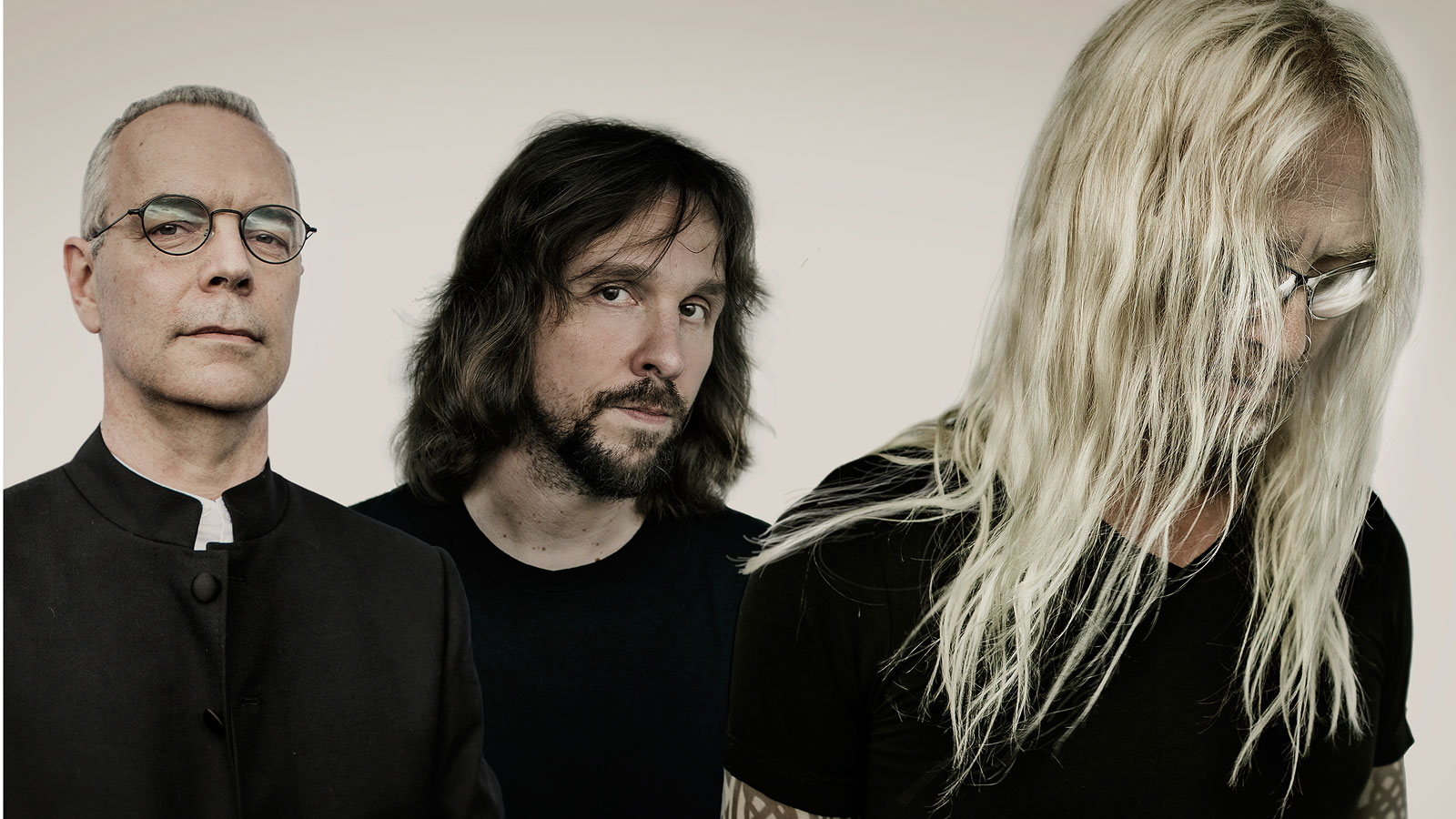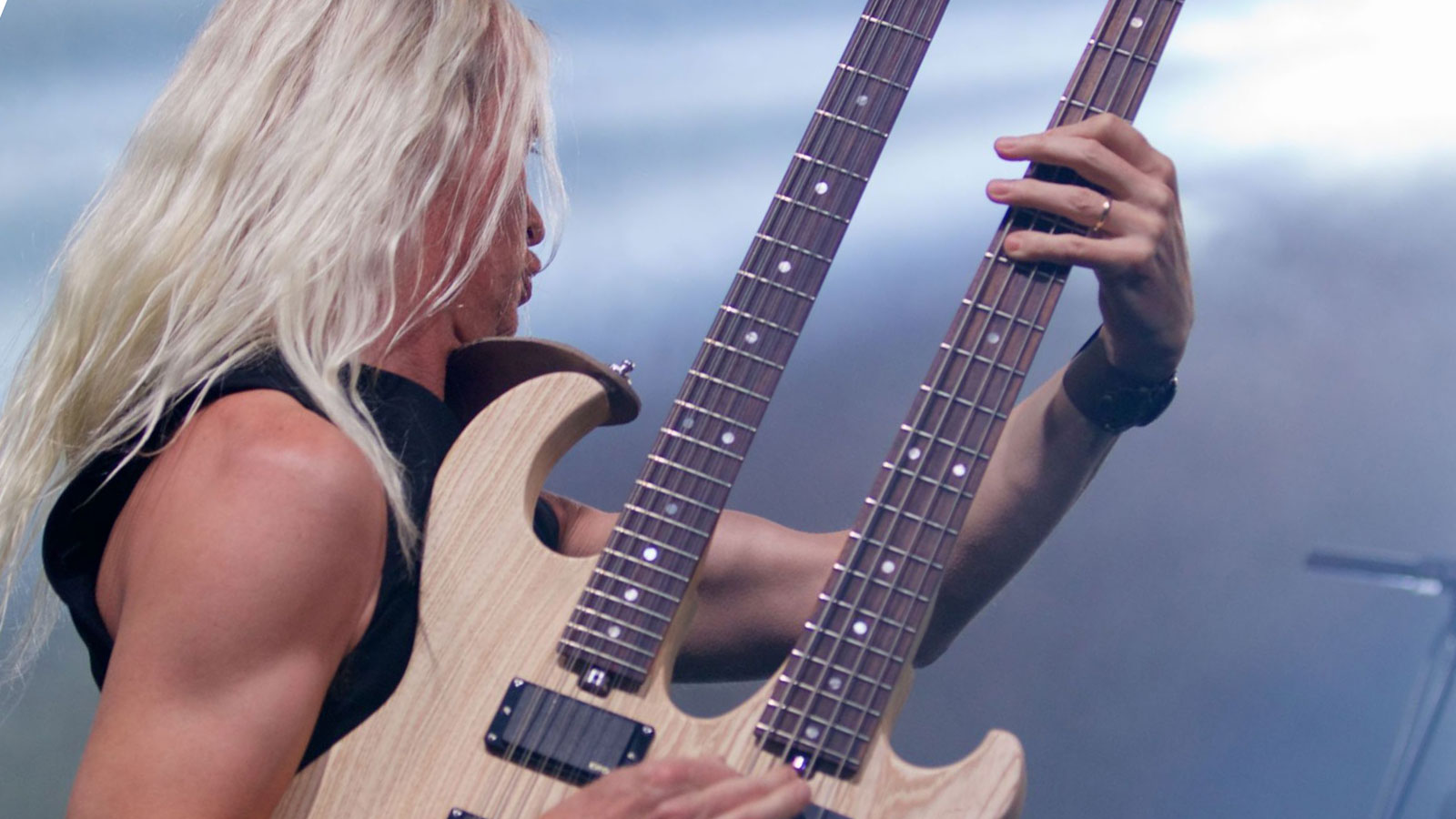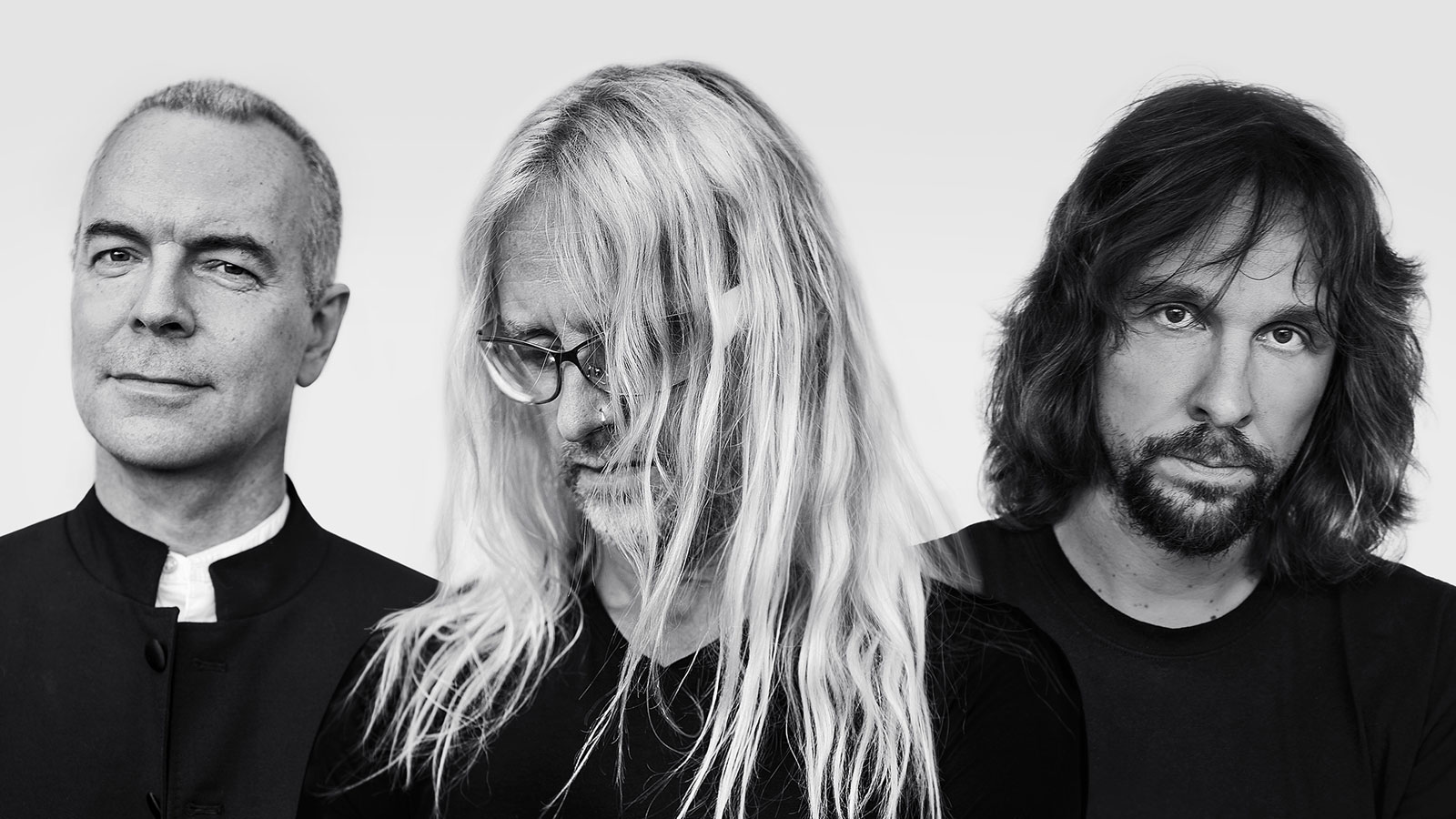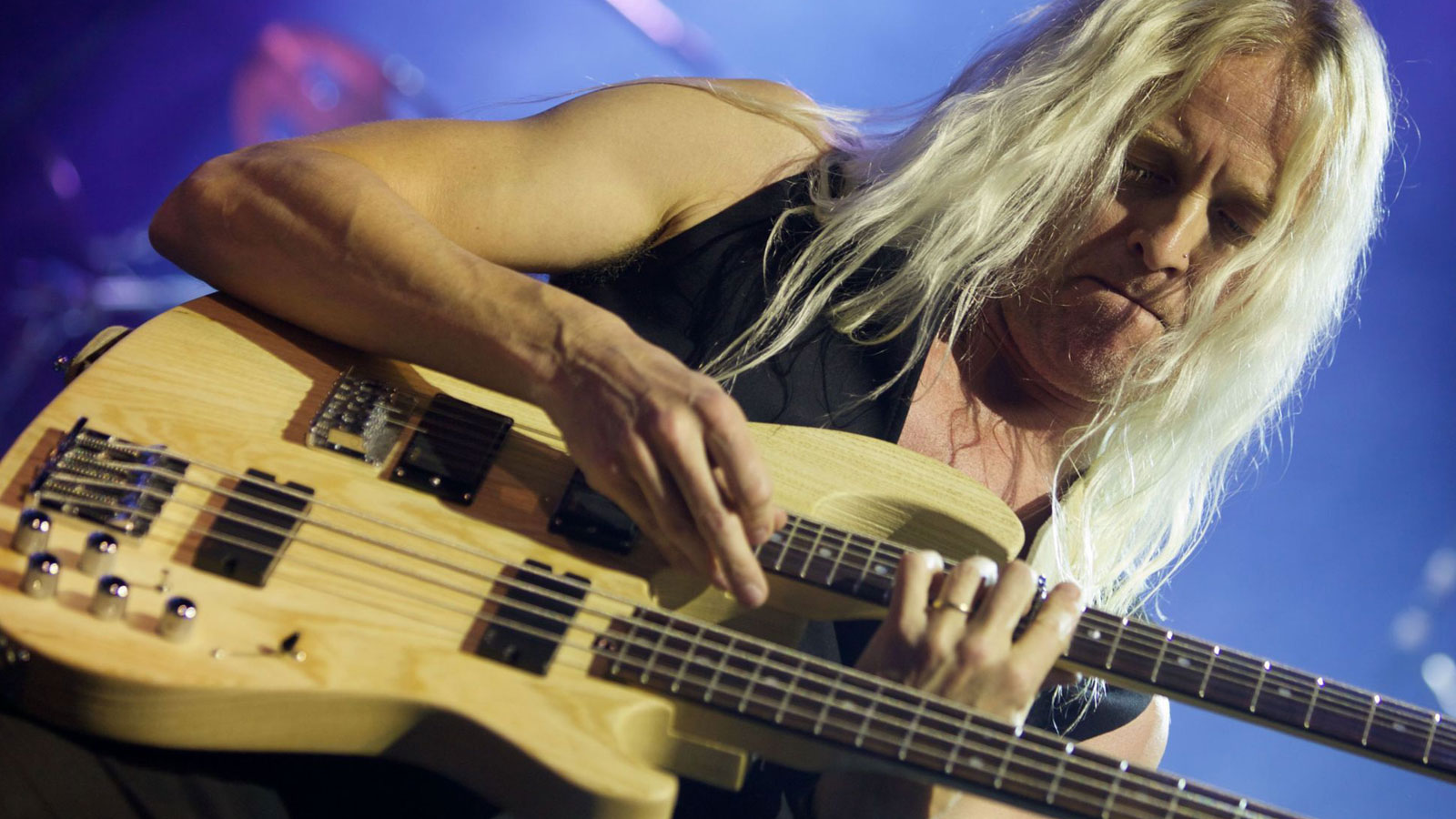Nick Beggs's top 5 tips for bassists
Some brilliant bass-heavy advice from the incredible Nick Beggs PLUS we hear all about his new band The Mute Gods

Intro - 1. Listen intently and train your ear
Versatile virtuoso Nick Beggs is arguably one of the greatest bass (not to mention Chapman Stick!) players to have emerged from the UK during the course of the past 40 years.
After first finding fame with new wave pop outfit Kajagoogoo in the early ‘80s - as bassist and then as lead vocalist from mid-1983 onwards - Beggs went on to become a seriously sought after sideman. Belinda Carlisle, Rick Wakeman, Gary Numan, John Paul Jones, Tina Turner, Maddy Prior, Midge Ure, Seal, Toyah Wilcox, Michael Bolton, Cliff Richard and Howard Jones are just a few of the stars to have benefitted from Beggs’s intuitive feel and commanding technical ability.
In recent years, Nick has established himself as the go-to bass and Stick player for both ex-Genesis axe genius Steve Hackett and prog rock king Steven Wilson, both live and the studio.
During the course of his multi-faceted career, Beggs has released two solo albums – Stick Insect [2002] and The Maverick Helmsman [2004] – and 2016 once again sees him pushing himself to the forefront. On January 22nd, Do Nothing Till You Hear From Me by Nick’s new band The Mute Gods will be unleashed and the album’s vibrant and eclectic mix of progressive rock stylings, political lyrics and pop sensibilities will be sure to turn the heads of fans old and new.
The Mute Gods line-up also includes two prominent A-list musicians, drummer Marco Minnemann (Joe Satriani, Steven Wilson, The Aristocrats) and keys player Roger King (Steve Hackett). Going right back, the project was actually initially prompted by Inside Out Music head honcho, Thomas Waber.
“I had a conversation with Thomas and he very calmly pointed out to me that I was working very hard for all of these other people but not doing anything of my own,” explains Beggs. “And I said, ‘Well, you know, I kind of buried that idea a long time ago’… and he said, ‘You should do something… we would put it out if it’s good enough and there’s no reason why it shouldn’t be’.
"And, suddenly, something crystalised in that moment. I used to be an A&R man for Phonogram in the 90’s. For a very brief period, I really enjoyed it. This idea came to mind that Thomas Waber was an A&R man that I respect and, I figured – having been an A&R man myself - I should be able to give an A&R man what he’s looking for. So I worked very closely with him. I decided that I would give Thomas what he was looking for. So, when I wrote a song - by and large - I would submit it to him and listen to his response.”
The lyrical themes running through Do Nothing Till You Hear From Me came to Nick Beggs at a relatively early point.
“A record company was prepared to do something with me so, with that in mind, I thought, ‘Okay, well, what is it that I want to say?,’ Nick says. ‘There’s a lot of music out there. There’s too much music out there. So if I’m going to say something, it better be valid. Do I have anything to say? And, for a while, I didn’t know whether I did. But I looked at my Facebook posts, and the stuff that I was historically writing about seemed to be to do with politics, religion, government, the way in which information is shared or withheld and important subjects like that.
"I decided that those were the things that I would write songs about, the things that I felt passionate about and the things that made me angry. I felt the need to get something off my chest and I suppose that’s at the heart of this. I needed to write about the things I’d like to change about the world and that need changing about the world.”
As with many of Nick’s records, the debut Mute Gods album also features extensive use of the Chapman Stick, an instrument that he has become virtually synonymous with. We ask him to summarise exactly what the Chapman Stick gives him and what he loves so much about it.
“The Chapman Stick is a unique instrument because it utilises a double-handed tapping technique and, as far as I see, it’s the first and only real instrument that’s designed for that,” explains Beggs. “Although it’s a stringed instrument in the same way the piano is, it could be argued it’s a percussion instrument in the same way as a piano is because you’re striking onto the fretboard with your fingertips and it gives you the potential for 10 note polyphony, although I never use 10 note polyphony. My technique isn’t that developed and I’ve never found it necessary.
"It’s split into two halves, a bass side and a treble side. The bass side is tuned in 5ths and the melody side is tuned in 4ths. It enables the player to self-accompany, in the same way you do when you’re playing the piano. You play the bass notes with your left, and you play the melody and the treble notes and the chords with your right. There’s at least three or four guitarists on the album including myself and also Marco [Minnemann] who played some additional guitar but a lot of my guitar is actually Chapman Stick. It sounds like guitar but the solos are Chapman Stick solos. I felt that it was important to push that forward because it has to be about what I do. It has to be what I’m known for and that gnarled rather frantic style of soloing is something I do. So I figured on things like Your Dark Ideas and Praying to a Mute God, I wanted to have those nasty almost Frippertronic Stick solos.”
Before Nick Beggs digs deep and gives us his top 5 tips for bassists, he just feels the need to preface the approach he has decided to take with his advice.
“There are no absolutes,” he says. “When it comes to finding your way as a musician – whether you’re a bass player or a drummer or a singer or a songwriter - there are no absolutes. I can only say that this is the way I did it. It’s not the right way… but it worked for me and, if somebody takes something away from this, then that’s fine!”
Do Nothing Till You Hear From Me by The Mute Gods is released on January 22nd 2016 by Inside Out Music
Top 5 Tips for bassists
1. Listen intently and train your ear
“I started off by listening - a lot! And I think if you do nothing else but listen, and listen very intently, and train your ear, you can have great success because good ears are the most important thing. I used to just listen to records and I had a ‘Thursday night is record night’ at my house when I was a teenager at school. Everyone used to come round and they’d bring their vinyl.
"Some of them had pilfered it from their elder brother or elder sister’s record collection but we’d all come round to my house and we’d sit and we all had the right to play an album. And also, we wouldn’t talk through it. We wouldn’t talk through each other’s records. It was reverential because whatever the person brought was submitted because it was something of value to them.
"Therefore, I made a real point of listening to what they brought. And each time I was listening through these records, silently sitting in this small room in my house, I’d think, ‘Okay, what should I listen to now? I’m going to listen to the drums. I’m not going to listen to anything else. I’m going to focus in on what the drums are doing.’
"And, of course, then I’d focus in on the bass, and I think that’s when my mind was really blown because the supportive role that bass gives to music is so important. It changes anything that anybody else is doing with different colours and shades. I realised the power of bass at a very early age by just listening…. and then learning the parts. I’d pick out certain songs and learn to play those parts. So listening and learning the parts that you like is number one.”

2. Develop your technical ability
“This one came later for me, when I begrudgingly realised that I needed to get more technical ability. Technique is very important. There’s two types of creatives in the world. There’s the artist and there’s the musician and they are completely different. They’re completely different things.
"I can sum this up with an example of the bass player Mick Karn. He was always a very original and creative artist of incredible proportions but, if you’d put him into a musician’s situation, he probably wouldn’t have been able to do it.
"If you’d asked him to go and read a chart or write a chart or read music or go into an ensemble and play as a backing musician for a number of other artists, he probably would have struggled. You need to be able to have your feet in both camps.
"When I was in Kajagoogoo, I couldn’t have told you the difference between a major and a minor scale. But, after that band finished, I had to think about making a living as a musician - as a professional technically competent musician and not as an artist anymore.
"So, I think learning modes, learning scales, arpeggios and getting stuff under your fingers, gives you stamina and performance ability to follow where your ears are going within seconds. That’s such an important thing.”

3. Learn to read music
“This was something I had to do.
"I had to learn to read music because I was moving away from the safety of being an artist with my own record deal. I had to be able to interpret what other people wanted me to do for them.
"And if I couldn’t do that, I actually had no validity in the arena… so I had to learn to read music and then try and assimilate as much theory as possible.
"I had a lot to learn and a lot to catch up with and I still do because I’m not a great understander of music theory but I know a hell of a lot more than I used to.”

4. Learn to write form
“You also need to learn to write basic musical form that enables you to know where you are in a piece of music.
"You need to understand chord shapes. You need to understand diminished and augmented minor, major shapes. And you should be able to write them out so you can follow a piece… and you need to learn the different signs that are used for making up musical form.
"And then move on from that and listen to music and write down the bass part. You’ll learn so much from doing that and you will become so much more confident in your own ability. And, of course, this is before we get to things like soloing or jazz theory.
"You know, this is just basic stuff to enable you to be the best you can possibly be within the industry.”

5. Play in as many bands as you possibly can
“Play in as many bands as you possibly can across as many different styles as possible. Don’t be bigoted about what music is. All music is valid – everything!
"All music means something to someone. And, if you can play all genres, then you have a greater chance of making a living in an industry that fundamentally is coughing up blood.
"And always play with people who are better than you! If you are going to be in a band, make sure you’re the worst player because that’s how you learn.”